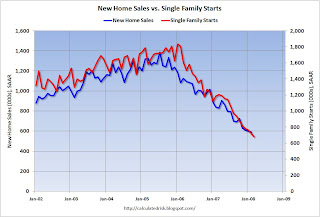by Calculated Risk on 4/19/2008 05:20:00 PM
Saturday, April 19, 2008
Comments on Roubini Interview
Yesterday I posted three videos of an interview with Professor Nouriel Roubini on Canadian TV. Professor Roubini believes the U.S. is currently in a recession, and that the recession will be deep and long - "the most severe recession and financial crisis that the US has experienced for decades" - lasting 12 to 18 months.
I agree that the economy is probably already in a recession, but I think Roubini may be too pessimistic. My view is the recession will be less than severe (with unemployment peaking at less than 8%), although I agree the effects - especially related to employment - will probably linger for some time.
Let me point out a few points in the interview where I believe Roubini is too pessimistic:
Professor Roubini on new homes sales vs. starts:
"The production of new homes - housing starts - has already fallen by 50%, but the problem is the demand for new homes has fallen by more, 60%."Actually the number of single family starts has fallen slightly more than new home sales.
 Click on graph for larger image.
Click on graph for larger image.This graph shows New Homes sales (seasonally adjusted annual rate) vs single family housing starts (SAAR). These two series can't be compared directly because single family housing starts includes homes built by owners - but the graph does show that starts have fallen as much or more than sales.
If you dig into the data and adjust for cancellations, it appears starts of single family homes (built for sale) have fallen below the current new home sales rate. See: More on Housing Starts
Even though Roubini is correct that inventories are at or near record levels (especially distressed existing home inventory), it's important to note that builders have finally cut production enough to start reducing the inventory of new homes. So we are probably a little further along in the process than Roubini suggests.
Roubini on walking away:
"In the United States, if you walk away from your home - what's called jingle mail because you put the keys in the envelope, you send it the banks and say goodbye - you don't have to pay the remaining balance between the value of your mortgage and the value of your home. So if you are really into negative equity - underwater - you have a huge incentive, especially if you don't have income you've lost your jobs - do to that."This is not completely accurate.
Although I agree with Roubini that changing attitudes towards default for middle class Americans is a significant risk - something we haven't been able to quantify - the consequences are more complicated than Roubini's description and might limit the number of homeowners who actually engage in ruthless default. Note: anyone considering walking away should probably consult a lawyer and a tax accountant.
In California, purchase money is non-recourse. If the borrower walks away and mails in the keys (Fleckenstein's "jingle mail"), the lender is stuck with the collateral. However, if the California borrower refinanced, then the lender has recourse, and can pursue a judicial foreclosure (as opposed to a trustee's sale), and seek a deficiency judgment.
The lender can enforce that deficiency judgment by attaching other assets, or by garnishing the borrower's wages. Historically lenders rarely pursued (or enforced) deficiency judgments, but that could change if many middle class borrowers, with solid jobs and assets, resort to jingle mail.
For purchase money, state law determines the recourse vs. non-recourse issue. Refis are always recourse, and there was significant refi activity in recent years. So a homeowner who chooses to "walk away" might be liable for some or all of the debt owed the lender. And the home buyers credit will be impacted - and there might be tax consequences too.
I still believe one of the greatest fears for lenders (and investors in mortgage backed securities) is that it will become socially acceptable for upside down middle class Americans to walk away from their homes. But my guess is the fear is far greater than what will really happen.
Roubini on the write down process:
"Major banks in the United States have already done something like $230 billion of write downs, but my estimate is when you are going to add it up those losses are going to be more like the order of $1 trillion. We are only at the beginning of the process of recognizing those losses. We might have a systemic banking crisis."It's hard to compare the investment bank write downs directly to the potential total losses, since many of the losses will be taken by hedge funds, regional banks, insurance companies, and wealthy individuals and others. The following table shows the IMF's estimate of losses by institutional category.
From the IMF's Global Financial Stability Report (via Econbrowser):
Notice the IMF's estimate of losses at the banks is on the order of $440 to $510 billion. This includes all banks, and my guess is the investment banks are further along in the process than many of the regional banks. I think we are well past halfway in write downs for residential mortgages at the investment banks, although there are many other credit losses still coming (like for consumer credit cards and auto loans, construction & development and commercial real estate loans, and corporate bonds).
Therefore I believe Roubini is a little too pessimistic when he says "We are only at the beginning of the process."
So as bearish as I am - especially on housing - I am less pessimistic than Dr. Doom!


